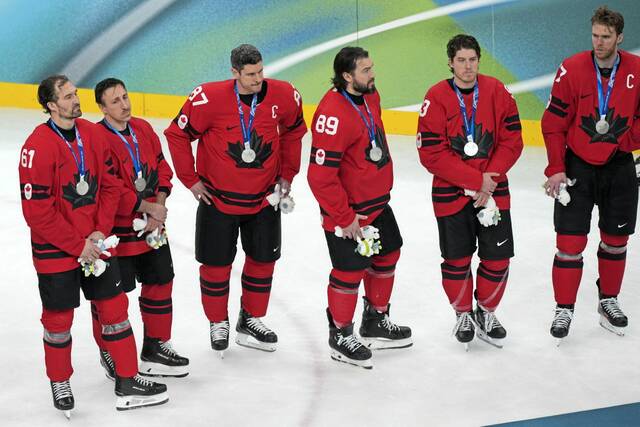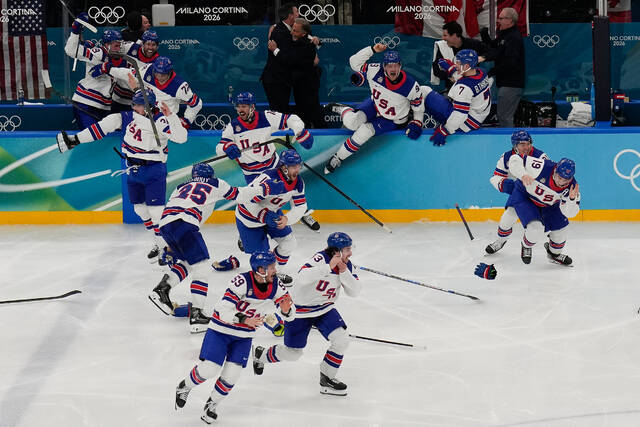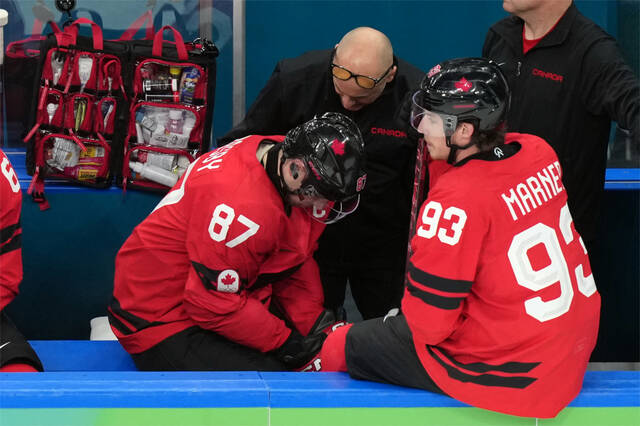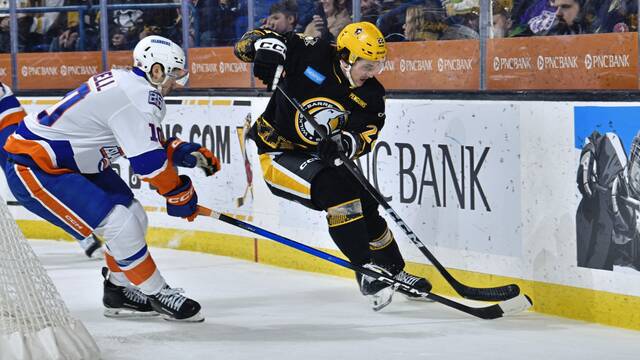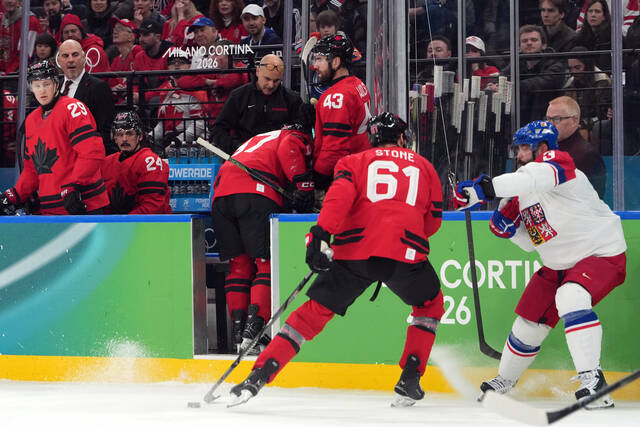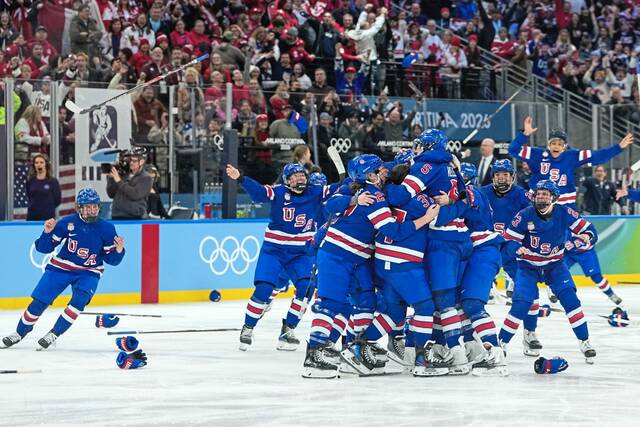First, let’s get the obvious question out of the way when it comes to Ron Hextall and the Penguins. It’s the same question that has followed him for 30-plus years and likely will follow him for another 30-plus years.
Why did he, as the starting goaltender of the Philadelphia Flyers, chase flamboyant Penguins scoring winger Robbie Brown in Game 5 of the 1989 Patrick Division semifinal series?
“I’m still chasing him,” chuckled Hextall, now the Penguins general manager. “If you see him, let me know. Not one of my finer moments, for sure.”
It was one moment. A very bad moment, no doubt. And it has largely defined Hextall, at least in Pittsburgh, for more than three decades.
But he had a history in Western Pennsylvania before that, having grown up in Green Tree while his father, Bryan, was a steady 20-goal scorer as a center for the Penguins in the 1970s.
“I knew at a young age, when I used to go to the rink with my dad on Saturdays and skating with the team after, I knew he did something special,” Hextall said via telephone Friday. “But I guess I probably didn’t know what everybody else’s dad did.
“Being in the locker room, skating after the Penguins, all those memories that I had, I knew it was special. I looked up to my dad, very much so for being a pro athlete but for also being the man that he is. I always thought hockey was pretty special. As I think it through, I had a grip that he did something that was pretty special when I was pretty young.”
Hextall’s family has ties to the NHL dating to the Great Depression when his grandfather, also named Bryan, was a star right winger for the New York Rangers. A member of the Hockey Hall of Fame, the elder Bryan Hextall scored an overtime goal that secured the Rangers the Stanley Cup in 1940 (as well as countless “Ninee-Teen Foorr-Teee!” chants over the next half-century mocking the Rangers’ futility in winning it again until 1994).
Much like his bellicose interaction with Brown in the spring of 1989, Hextall doesn’t seem to feel his family’s legacy defines him — either as a star goaltender in his previous life or in his current vocation as a front-office manager. But he doesn’t take his good fortune for granted either.
“I was asked when I was younger, ‘Did you feel pressure?’ ” Hextall said. “You’re a Hextall and to carry on the legacy. My parents never put pressure on me to be an NHL player. Just do what you want to do, work hard and be the best that you can be at it. But I never felt a ton of pressure to be an NHL player. But I will say, there hasn’t been a day, including today, to work in the National Hockey League. It’s not the real world. I understand that.
“Not a day goes by that I’m not appreciative of working in the league.”
During his playing days, Hextall saw himself taking on a front office role such as the one he inhabits.
“I don’t think there was any question, even when I was a young player, that’s what I wanted to do when I was done (playing),” said Hextall, now 56. “You don’t look at it necessarily like that at that time because you’ve got whatever, 10 or 12 or 15 years ahead of you. But I did know I wanted to work in the game the rest of my life. It is my passion. I’ve been very fortunate to do it, quite frankly.”
On Friday, he discussed a number of issues involving his current gig overseeing the Penguins:
• The challenge of taking on a team midseason in the midst of a global pandemic has been, to put it mildly, daunting:
“For myself coming in, learning the protocols and what is OK and what is not OK, I think I’m probably still learning about it. It’s tough. It’s more taxing, I think, on all of us, including the players. They got their days off, and they’ve got to come in and get tested. It’s not ideal, but it’s the world that we live in. But I think our guys have done a real good job of dealing with it.”
• The process of evaluating the front staff he inherited has gone slowly because of a lack of direct interaction related to medical protocols for covid-19:
“It’s really tough because the first thing that I would have liked to do is bring our staffs in, our pro staff and our amateur staff, and let’s sit in a room and meet and let’s talk and let’s kind of define the way things we’re going to do things moving forward. So that’s been tough, to be frank. But it is the world that we live in, and everybody is dealing with the same issues. I don’t know a lot of our staff. Certainly, we’re evaluating things as we go along here.”
• Hextall has viewed incumbent assistant general manager Patrik Allvin as an asset. Additionally, the recent hiring of director of player personnel Chris Pryor, who worked for Hextall during his stint as Flyers general manager, has provided a trusted voice to help manage the franchise.
“Patrik Allvin has been terrific in terms of kind of walking me through the way the organization works and some of the mechanics of the day-to-day operations. Patrik has been terrific. I spent quite a bit of time with him.
“Chris is a big add for us. He’s a top personnel guy. And Patrik is a top personnel guy, too. Really excited about that too. And, obviously, (president of hockey operations Brian Burke) has been through everything and done everything. He’s terrific to have to talk to. We talk a lot. We watch the games together. We evaluate things together. I’ve been really excited with how things are going. We have lots of work to do, but that’s the fun part.”
• The pandemic has sped up the process of getting familiar with the coaching staff:
“I’ve spent a decent amount of time with the coaches, quite a bit. We were on the road for a week there. I feel like I’m getting to know the coaches. We’ve spent a lot of time with them. That’s been good. When you’re on the road, you’re around people. They’re not at home. They’re around the hotel. That’s been great. There’s some positives with, I think, the pandemic as well. We’re pretty much locked in the hotel so we’ve spent a lot of time together.”
• Hextall seems happy with the roster he has inherited, particularly from a standpoint of depth:
“I like the way our team has played. If you look at the chemistry that (forward Kasperi) Kapanen and (forward Evgeni Malkin) are developing right now, Kasperi is taking his game certainly to another level. (Sidney Crosby’s) line is Sid’s line. Teddy Blueger’s line, we’ve gotten contributions from them most nights. I like the way (Mark Jankowski’s) line is playing the last couple of games. The defense, you add (Brian Dumoulin) to the back end, it puts everybody back into their ice time slots and whatnot. Obviously, he’s a good fit with Kris (Letang). I like the way our group is playing right now. With (forwards Jason) Zucker and (Jared) McCann out, (forward) Evan Rodrigues has kind of stepped into a higher spot.
“You saw (Thursday) night, with (defenseman John) Marino out: Chad Ruhwedel went in and did a real good job for us. … Goaltender Tristan (Jarry) has been really good. And when Casey (DeSmith) has been called on, he’s done a good job for us. I like where we’re at right now and, hopefully, we can continue to build and continue to play the way we’re playing.”
• By design, his predecessor, Jim Rutherford, largely crafted a quick, skilled roster that did not possess an abundance of toughness or physicality. Hextall was vague when asked he feels a need to bolster that attribute:
“Every team would like to add a little bit of toughness. There’s very few of those guys around. If you look at a perfect world, a wish list, that would certainly be on the list.”
• With the trade deadline a month away (April 12), does he see any particular area of need? And would he be open to dealing away any future assets such as a prospect or a draft pick?
“First of all, you have a salary cap. Then we have to balance now and the future. Of course, everybody would like to get better. Whether it’s impossible or not, I don’t know. We’ll see what comes along when the deadline is here. You don’t know what’s going to pop up, what’s going to be available. If there’s a way to make our team better, we’d love to do it. But I don’t anticipate giving up a big, young piece for a rental or that kind of deal.”
• Zucker is on long-term injured reserve because of an undisclosed ailment. That designation allows the team to relieve itself of some of his ample salary cap hit of $5.5 million and put it towards some potential roster moves. But there appears to be some hope Zucker can return to the lineup before the regular season ends:
“We’re hoping he comes back before the playoffs start. We’ll see as we go along here. We’ll have a better evaluation of that down the road. At this point … we have to make the playoffs, and we’re in an absolute dog fight and we’ve got to keep our foot on the gas. If we do get towards the end of the year, and Jason (gets healthy), he certainly will be a tremendous add, almost like a trade deadline (acquisition).”
• Hextall might have been an old-school player, particularly given his rambunctious nature. But he’s very much new school when it comes to analytics and the role they play in crafting a roster. This week, the team bolstered its staff with the hiring of Katerina Wu, a data scientist. She joins Sam Ventura, director of hockey operations and hockey research. Hextall was verbose when asked about advanced metrics:
“We’re extremely happy to add Katarina. To add a young woman to our staff, we’re very excited. The analytics part is a part that is growing. It’s an important part. It’s not the only part. There’s a lot of different mechanisms that we use to evaluate players and teams and team play. But the analytics part is a part that I’m very invested in, very interested in. The growth that I’ve seen in the last five or 10 years is absolutely phenomenal. It’s not going to slow down. It’s going to be a big part here moving forward. It helps you question yourself or question certain things that are going on in the game or elements of the game that you need to add to your team.
“There’s so many things that come out of it in terms of team play and individual play. It gives you good sounding boards for questions for your scouting staff and your coaches and myself and the top personnel guys. It’s very detailed, and you have to figure out what you want because there’s a lot of data out there and you have to organize it and make sense of it. But it’s a very interesting part of the game. It’s going to be (prominent) more and more moving forward. You certainly can’t forget about the personnel eyeballs (scouting). They’re a very big part of it, watching young players, scouting, watching teams. But the analytics parts is a real nice piece to the pie.”
• Hextall first encountered analytics when he joined the Los Angeles Kings as an assistant general manager in 2006:
“We started using them pretty early in (Los Angeles), I think in the first season there, (2006-07). In saying that, as you look back at them now, they’re archaic. We always looked at a player’s points way back. We used to look at points per game versus points. It’s so elementary, but that’s where we were at that point. It has come a long way to say the least.”
• Under Rutherford and previous general manager Ray Shero, the Penguins, by design, sacrificed future assets in the name of winning “now.” That approach largely worked as evidenced by the three most recent Stanley Cup banners the team possesses from 2009, ‘16 and ‘17. But it has left the franchise with one of the shallowest pools of prospects in the NHL.
Fixing that issue won’t be easy in the immediate sense as the Penguins do not have a first-, third-, fourth- or sixth-round draft pick in his year’s draft:
“We’re going to probably continue to do what they’ve done here looking at the college free-agent market and the European free-agent market to see if we can grab a couple of players out of there. We do have some (prospects) on our list. We have two goalies (2020 draft picks Joel Blomqvist and Calle Clang) and (forward prospects Sam Poulin and Nathan Legare) there. (Defenseman P.O Joseph.) We’ve got some kids. But we do need to add. There’s a today, but there’s also a future here. We’ve got to keep one eye on the future as well.”
• The team can begin negotiating contract extensions with All-Star forward Malkin and defenseman Letang this summer as they enter the final year of their respective contracts:
“It’s on the radar, but right now, we’re just trying to win games. We’ll get to that when the time is right.”
• Finally, despite considerable financial losses because of the pandemic, namely ticket revenue, Hextall indicated he is under no economic constraints from upper management in how he operates the team:
“No. Ownership has been terrific. We’ve had good communication, and they’ve pretty much given me the green light to do what we can to do make our team better and make our staff better or whatever needs to be done.”



